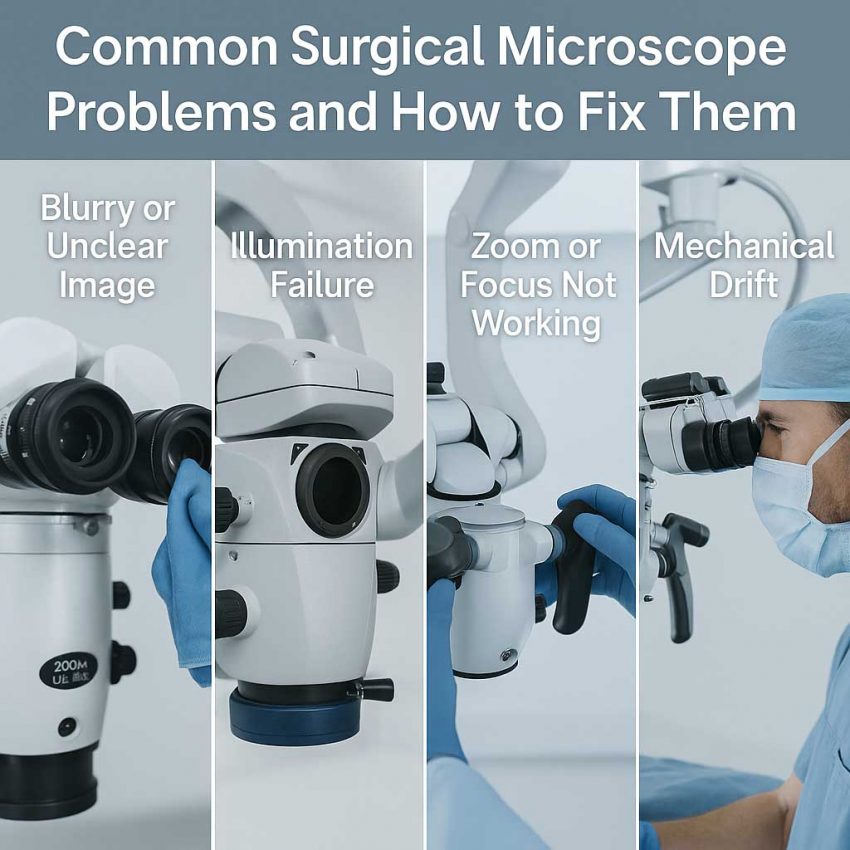Discover the most common surgical microscope problems and learn how to fix them quickly. Troubleshooting tips for lighting, optics, and mechanical issues in the operating room.
Surgical microscopes are essential tools in modern medicine, but like any precision equipment, they can occasionally experience performance issues. Knowing how to identify and fix surgical microscope problems can help reduce downtime and prevent complications during critical procedures. In this article, we’ll explore the most common issues and how to troubleshoot them efficiently.
1. Blurry or Unclear Image
Symptoms: The image appears out of focus, hazy, or distorted.
Causes:
- Dirty or smudged objective lenses or eyepieces
- Incorrect diopter settings
- Misaligned optics
Solutions:
- Clean all optical surfaces using lens paper and optical-grade cleaning solution.
- Recalibrate the diopters and ensure both eyepieces are equally focused.
- Check internal alignment—if unclear, consult a certified technician for re-collimation.
2. Illumination Failure
Symptoms: The light source does not turn on or is flickering.
Causes:
- Burnt-out LED or Xenon bulb
- Loose power cable or faulty connection
- Defective power supply or light module
Solutions:
- Replace the light bulb with a manufacturer-approved replacement.
- Ensure all power cables are securely connected and not frayed.
- If issues persist, test with a different power outlet or contact technical support.
3. Zoom or Focus Mechanism Not Working
Symptoms: The zoom or focus controls are unresponsive or stiff.
Causes:
- Lack of lubrication in mechanical joints
- Internal gear damage or wear
- Improper handling or impact
Solutions:
- Apply microscope-safe lubricant to the affected areas.
- Avoid forcing any knobs—consult the manual or technician if resistance persists.
- Schedule regular servicing to detect early signs of wear.
4. Uneven or Dim Light Field
Symptoms: Brightness is inconsistent or the field is unevenly lit.
Causes:
- Misaligned light path or dirty internal mirrors
- Improperly installed light filters
- Worn-out fiber optic cable
Solutions:
- Clean the internal mirror housing and filters carefully.
- Inspect and realign the fiber optic light cable if necessary.
- Replace aged filters or cables with compatible accessories.
5. Mechanical Drift or Loose Positioning
Symptoms: The microscope head drifts or does not hold position properly.
Causes:
- Loose locking knobs or worn tension springs
- Overloaded arm or incorrect counterbalance
Solutions:
- Tighten all axis locks and verify tension settings in the arm.
- Adjust the counterbalance according to the microscope’s weight and configuration.
- If the issue continues, consult your service provider to inspect the suspension system.
When to Call a Professional
While many surgical microscope problems can be handled in-house, certain issues require expert help:
- Persistent electrical malfunctions
- Optical misalignment that affects image quality
- Mechanical part replacements or upgrades
Always follow the manufacturer’s guidelines and avoid DIY repairs that may void your warranty.
Preventive Tips
- Log all maintenance activity and repairs
- Use original parts and accessories
- Train staff in safe handling and storage
- Schedule annual servicing with certified professionals
Conclusion
By recognizing the signs of common surgical microscope problems and applying the right fixes, you can maintain the performance and reliability of your equipment. Routine care, prompt troubleshooting, and professional servicing are the keys to minimizing disruptions and ensuring high-quality surgical outcomes.
Looking for more maintenance guides? Visit our full library at SurgicalScopeHub.com.
